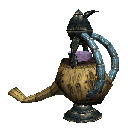
Introduction

Characters

Magic

Religion

Alchemy and
Enchantment

Monsters

Adventures:
Elsweyr (Skooma)

Tools
 Introduction |
 Characters |
 Magic |
|
 Alchemy and Enchantment |
 Monsters |
 Adventures: Elsweyr (Skooma) |
 Tools |
There's a lot of detailed background to the religion and cosmology of the Elder Scrolls world, and you could spend weeks, or longer, studying it. I'll just go through the basics here.
There are about nine Aedra, or gods, which make up the Imperial pantheon. Eight are older than the world; the ninth is the ex-human ascended God-Emperor Talos. The Aedra cannot be killed nor enter the physical realm, and don't interfere with the world. They're like the Abrahamic God, invisible, watching over us but not really getting involved. Officially, all the Empire worships the Aedra.
The Aedra are: (links to descriptions on uesp.net)
| Akatosh | Arkay | Dibella |
| Julianos | Kynareth | Mara |
| Stendarr | Talos | Zenithar |
There are about sixteen Daedra, or demons. In principle they are set against the Aedra, but in practice they often fight each other and indulge in petty scheming. The Daedra can enter the world of Tamriel, and will happily mess with mortals for their own reasons, which are rarely comprehensible to mortals. They can be killed (but good luck with that), although it just returns them to their home dimension, Oblivion, for years while they recuperate. They're like the Olympian gods, rarely seen, but nobody can deny that they exist and interact with the world. Daedra worship is illegal in the Empire, tolerated only in the outlying regions (such as Morrowind) where Imperial control is weak.
The Daedra are: (links to descriptions on uesp.net)
| Azura | Boethiah | Clavicus Vile | Hermaeus Mora |
| Hircine | Malacath | Mehrunes Dagon | Mephala |
| Meridia | Molag Bal | Namira | Nocturnal |
| Peryite | Sanguine | Sheogorath | Vaernima |
Aedra worship isn't enforced, as such; each Imperial citizen is free to take the religion as far as they like. Many people choose to worship one of them, or the whole pantheon, fairly casually. Some people take it further, becoming a priest of their chosen Aedra or Daedra, and gaining powers granted by their deity.
In game terms, a player can (but doesn't have to) choose an Aedra or Daedra to worship casually. This costs no points, and is more of a character description than anything else. A priest, on the other hand, forms a contract with their sponsor. This consists of the Power Investiture advantage, a few disadvantages such as Discipline of Faith, and a set of spells granted by their chosen deity.
The spells should be appropriate to the deity chosen. They should fit the deity's demeanor, and generally, spells granted by Aedra will be more subtle than spells granted by Daedra. Have a priest start at Power Investiture 1, and if they perform their religious duties well, let them spend points to raise their Power Investiture occasionally, granting additional spells but also increasing their corresponding disadvantages. Try to be imaginative with the disadvantages; where Julianos is likely to be content with strict ritual and prayer schedules, Namira may warp her priests' faces, reducing their attractiveness. Also remember that openly worshipping Daedra in the heart of the Empire is likely to get you executed!
Spells granted by Aedra and Daedra use the optional "Clerical Magic" rule (GURPS Characters p.242). I give five spells per level of Power Investiture, granting new spells whenever the character did something outstanding in the service of their god, and increasing both Power Investiture and the accompanying disadvantages after every five spells gained. I give the spells at a fixed skill level, set in relation to IQ and Power Investiture, so the character can only improve their ability with the spell through dedication to their deity.
However, divine spells have a distinct advantage over regular spells - as long as you keep in good standing with your deity, you'll enjoy better critical successes and less harsh critical failures, and if you're a Daedra worshipper, you might just be able to ask your deity to intervene directly once in a while. For example, in my campaign, the Shadowscale Priest of Boethiah was caught bang-to-rights for all his murders, but managed to escape by invoking Boethiah, who unlocked his cell and paralyzed his captors just long enough for him to flee the country and become an NPC!
In principle, I don't see any reason why a PC can't be a priest of more than one deity. However they would have to satisfy the religious contracts of all of their sponsors; further, no Aedra would tolerate Daedra worship, and many Daedra are in direct opposition to one or more other Daedra, so it would be very difficult to pull off, especially while also juggling the demands of an itinerant adventuring party! As I write this, I find like the idea - I might encourage one of my group to try this out.
Note that the Daedra described here are the Daedric Princes, each with their own domain of Oblivion. The ordinary daedra who enter the Tamriel and fight mortals are entirely different, and can be easily killed.